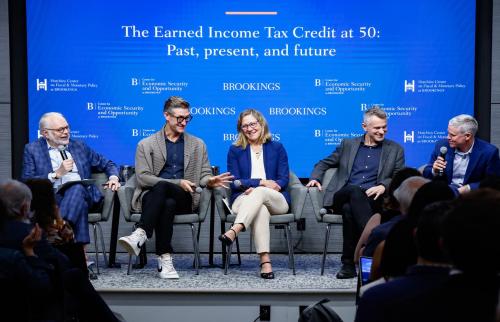Budget season is upon us, as Washington eagerly awaits President Obama’s 2015 budget request. Budgets are much more than an accounting exercise. Those columns of numbers, taken together, reveal a policymaker’s convictions about what government ought to do, how, and for whom. As Wonk Washington heads into next week, and chatter about the budget crescendos to a shout, it’s worth keeping in mind some basic truths about everyday Americans’ lived economic experiences.
The Problem with the Poverty Line
Many of the programs in the federal budget that aim to tackle economic security will likely be discussed in the context of the poverty line, or “lifting people out of poverty.” The idea of the poverty line forces us to think in binary terms. In other words: Is an individual poor, or not poor? Yet, as a recent Census report highlights, families’ incomes are remarkably dynamic. Many families enter and exit poverty multiple times over the course of a year. While the vast majority of the poor in a given year are no longer officially below the poverty line the following year, about half of those who “escape” poverty continue to have incomes less than 150 percent of the poverty threshold. Viewing poverty as a dynamic state, rather than a static, binary one, allows us to refocus on families’ economic lives in a way that more closely captures their everyday experiences.
Steep income drops and economic insecurity didn’t begin with the Great Recession. In 2004, for instance, 13.6 percent of families saw their incomes drop by at least half at some point over the course of year. Less than half recovered to at least 100 percent of their pre-drop income in the year after that drop. These and other studies suggest that economic instability is too common for a nation that once declared itself committed to creating security and opportunity for all.
Instability Begets Immobility
Moreover, today’s economic instability may well become tomorrow’s economic immobility. A variety of data suggest that a child growing up in a downwardly-mobile family faces diminished prospects for upward mobility in adulthood. Economists have also found that parental job loss decreases earnings and increases the likelihood that their children will receive welfare as adults.
If a child’s economic prospects are impacted by the trajectory of her family’s income during her childhood, then focusing narrowly on the poverty threshold is missing an important part of the picture. Policy should be evaluated not only on what it does for levels, but also on what it does for economic trajectories. This is hard work, to be sure. Budget wonks ought to keep this in mind when evaluating the President’s proposal next week.
The Brookings Institution is committed to quality, independence, and impact.
We are supported by a diverse array of funders. In line with our values and policies, each Brookings publication represents the sole views of its author(s).




Commentary
How about Unstable Americans: How Income Volatility May Hurt Social Mobility
March 3, 2014